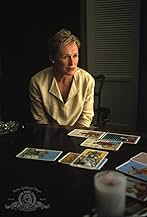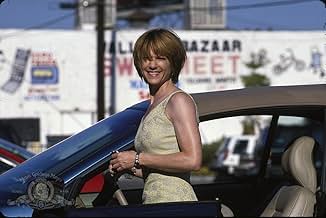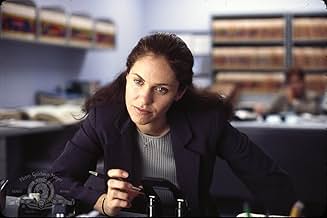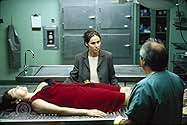IMDb RATING
6.4/10
7.6K
YOUR RATING
Five California women struggle with personal problems as their own paths unwind in unexpected ways.Five California women struggle with personal problems as their own paths unwind in unexpected ways.Five California women struggle with personal problems as their own paths unwind in unexpected ways.
- Nominated for 1 Primetime Emmy
- 2 wins & 1 nomination total
Penelope Allen
- Nancy (segment "Fantasies About Rebecca")
- (as Penny Allen)
- Director
- Writer
- All cast & crew
- Production, box office & more at IMDbPro
Featured reviews
Writer/director Rodrigo Garcia's feature film debut "Things You Can Tell Just by Looking at Her" might have a jarring, if too long, title, but the son of Gabriel Garcia Marquez presents a passionate work of cinematic fiction. The film presents several short stories; snapshots of women at a crossroads. One story is of a doctor who has lost sight of spiritual meaning in her life, and has elicited the assistance of a tarot card reader to help her find her way. This card reader may assist people with getting through the future with clarity, but she has one foot in the past as she watches her girlfriend succumb to a debilitating disease.
Each story intersects and overlaps the others in unique and interesting ways. The all-star cast of female talent bring to their deliberately under drawn characters some of their strongest performances, especially Calista Flockhart (at the time, fresh from "Ally McBeal") who provides her psychic character with fairy-like innocence, Kathy Baker who brings good-natured humorous curiosity to a role that could have quickly become a sociopath stalker, and Holly Hunter in an understated performance as a bank owner who contemplates the ramifications of motherhood on her life.
Each story intersects and overlaps the others in unique and interesting ways. The all-star cast of female talent bring to their deliberately under drawn characters some of their strongest performances, especially Calista Flockhart (at the time, fresh from "Ally McBeal") who provides her psychic character with fairy-like innocence, Kathy Baker who brings good-natured humorous curiosity to a role that could have quickly become a sociopath stalker, and Holly Hunter in an understated performance as a bank owner who contemplates the ramifications of motherhood on her life.
Things you can tell just by looking at her
In Things you can tell just by looking at her we meet several women who for different reasons seem to be playing bit parts in their own lives. One of them takes care of her mother in a big lonely house, Rebecca stops listening to her own feelings because a baby does not fit into the life of her married lover, Rose discovers that her son is growing up, Calista's girlfriend is dying and ? takes care of her blind sister.
After watching the film I thought: what does this film want to tell us about women? Or perhaps people in general. Some of the lines in the film stuck in my mind: The blind girl says about the woman who committed suicide: `I bet you could tell just by looking at her that there was a man involved.' When giving this line some thought I starting seeing the film as a comment on `loneliness' in general. What do people really want? They want to be involved with people. They want other people to see them.
The film suggests that when people don't depend on anyone anymore when they have no one `to be' for - they chose to actually become nothing to die. The loneliness at the heart of existence is too hard to bear. I think the film is about the nature of making connections and being involved with other people although it is painful and sometimes lead to self-sacrifice. It shows us the horror which is tied with the fear of being left alone, although the connections which are made does little to remove the feeling of loneliness. It is the horror of a stranger walking into your personal sphere and immediately being able to see through you and see what lies beneath the surface. It is the horror of revealing your interest in other people - looking in on other peoples lives, in a desperate attempt to connect and to become involved. It is the horror of becoming involved with someone who cannot stay, the horror of losing those whom you connect with. When you are involved, and when you connect with someone, you face the danger of being hurt, being dumped - of sacrificing your own life in your care for others. It is the horror also that your sacrifice is not appreciated, the horror that when you are no longer a lover or a mother then you will certainly become nothing that your identity is so intricately tied with the dependence of those who need you that you cannot be `you' if they don't need you anymore. It is ultimately the horror of being defined by relations of interdependence where the people you care for in effect give you identity. It is the horror that you really are nothing without other people to mirror yourself in.
Why is this form of `self-sacrifice' then particular to women? We learn from Walter's daughter that when he really gets involved `He dumps them like a hot potato'. Are women victims and easy to exploit? Rose's teenage son confides that people `are always' looking for someone. But is the act of making these connections and becoming involved truly more important to women - truly more essential in their attempt at becoming someone - of gaining an identity. Are women always characterized by either being cared for or being the ones who take care of others? Interestingly, none of these women are wives - they are defined by other types of relationships than those that arise between man and wife.
I do not think I can answer these questions and I don't think the film wants to answer them either. But I think the film is a point of departure for discussing the nature of being - and the way we all perhaps depend upon others in order to become.
7/10
In Things you can tell just by looking at her we meet several women who for different reasons seem to be playing bit parts in their own lives. One of them takes care of her mother in a big lonely house, Rebecca stops listening to her own feelings because a baby does not fit into the life of her married lover, Rose discovers that her son is growing up, Calista's girlfriend is dying and ? takes care of her blind sister.
After watching the film I thought: what does this film want to tell us about women? Or perhaps people in general. Some of the lines in the film stuck in my mind: The blind girl says about the woman who committed suicide: `I bet you could tell just by looking at her that there was a man involved.' When giving this line some thought I starting seeing the film as a comment on `loneliness' in general. What do people really want? They want to be involved with people. They want other people to see them.
The film suggests that when people don't depend on anyone anymore when they have no one `to be' for - they chose to actually become nothing to die. The loneliness at the heart of existence is too hard to bear. I think the film is about the nature of making connections and being involved with other people although it is painful and sometimes lead to self-sacrifice. It shows us the horror which is tied with the fear of being left alone, although the connections which are made does little to remove the feeling of loneliness. It is the horror of a stranger walking into your personal sphere and immediately being able to see through you and see what lies beneath the surface. It is the horror of revealing your interest in other people - looking in on other peoples lives, in a desperate attempt to connect and to become involved. It is the horror of becoming involved with someone who cannot stay, the horror of losing those whom you connect with. When you are involved, and when you connect with someone, you face the danger of being hurt, being dumped - of sacrificing your own life in your care for others. It is the horror also that your sacrifice is not appreciated, the horror that when you are no longer a lover or a mother then you will certainly become nothing that your identity is so intricately tied with the dependence of those who need you that you cannot be `you' if they don't need you anymore. It is ultimately the horror of being defined by relations of interdependence where the people you care for in effect give you identity. It is the horror that you really are nothing without other people to mirror yourself in.
Why is this form of `self-sacrifice' then particular to women? We learn from Walter's daughter that when he really gets involved `He dumps them like a hot potato'. Are women victims and easy to exploit? Rose's teenage son confides that people `are always' looking for someone. But is the act of making these connections and becoming involved truly more important to women - truly more essential in their attempt at becoming someone - of gaining an identity. Are women always characterized by either being cared for or being the ones who take care of others? Interestingly, none of these women are wives - they are defined by other types of relationships than those that arise between man and wife.
I do not think I can answer these questions and I don't think the film wants to answer them either. But I think the film is a point of departure for discussing the nature of being - and the way we all perhaps depend upon others in order to become.
7/10
The only other movie I've ever been moved to write a comment for was Mission to Mars. Unlike MtM, which I was moved to review due to it being one of the very worst movies I've ever seen, this one is truly touching. Things You Can Tell... is a testimony that an American movie, with well-known American actors, can be delicate, beautifully acted, and most of all, not chewed and explained to death. It does not regard its viewers as braindead; neither does it regard them as artsy. It is a movie for everyone, about people just like us.
This is not an art-house movie - the story plot is a collection of stories about the everyday lives of everyday women (the reviewer who said she never seen such repulsive characters might be in for a shock if she actually talks to her daughter / mother / sister).
It shows women beautifully, and absolutely believably. It also shows nicely that diversity is not a question of the skin color, but of the attitude (hence the stories feature only white women).
It's also not a chick flick - while certainly it will be loved by women, it also works for cynical, hard to move guys like me.
Watch it, it's really good, in a not-in-your-face, subtle way.
This is not an art-house movie - the story plot is a collection of stories about the everyday lives of everyday women (the reviewer who said she never seen such repulsive characters might be in for a shock if she actually talks to her daughter / mother / sister).
It shows women beautifully, and absolutely believably. It also shows nicely that diversity is not a question of the skin color, but of the attitude (hence the stories feature only white women).
It's also not a chick flick - while certainly it will be loved by women, it also works for cynical, hard to move guys like me.
Watch it, it's really good, in a not-in-your-face, subtle way.
The rest of the movie was a little too self-consciously "arty' for me, but Holly Hunter's performance made it all worthwhile. Her scene on the street was absolutely heart-stopping in its truth. The depth of her emotion is almost an embarrassment to watch. Wonderful stuff, Holly...
This film consists of several different stories that are very loosely connected to each other. I was drawn into each individual story but would have liked to have known more about them. What would have made this film really good in my opinion is if there had been a single strong story line woven through all the stories; an interconnection that would have kept the coincidence intact, but would have made it an unseparable whole. That is what I missed. I am very happy though that at the end there was a kind of closing to each of the stories, but that really deserved more time. So a good film, with interesting characters and good portrayals, but it lacked the depth and interconnection that it made me both expect and hope to find.
Did you know
- TriviaA Braille book that Carol Faber reads is "One Hundred Years of Solitude" by Gabriel García Márquez who happens to be the father of Rodrigo García, this film's director.
- ConnectionsFeatured in The Rosie O'Donnell Show: Episode #4.170 (2000)
- How long is Things You Can Tell Just by Looking at Her?Powered by Alexa
Details
- Release date
- Country of origin
- Official site
- Language
- Also known as
- Con tan solo mirarla
- Filming locations
- Production companies
- See more company credits at IMDbPro
Box office
- Gross worldwide
- $1,433,668
- Runtime1 hour 49 minutes
- Color
- Sound mix
- Aspect ratio
- 1.85 : 1
Contribute to this page
Suggest an edit or add missing content

Top Gap
By what name was Things You Can Tell Just by Looking at Her (2000) officially released in India in English?
Answer





































